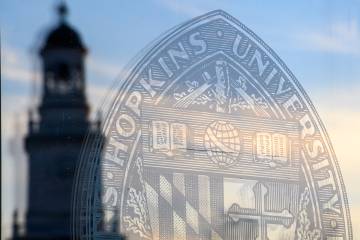- Name
- Doug Donovan
- dougdonovan@jhu.edu
- Office phone
- 443-997-9909
- Cell phone
- 443-462-2947
Johns Hopkins University President Ron Daniels and Provost Ray Jayawardhana sent a message to the Hopkins community this evening regarding an encampment initiated at the Homewood campus on April 29.
Their complete message is below:
Dear Johns Hopkins Community,
We are writing to update you on the ongoing encampment at our Homewood campus.
With the help and support of many members of our faculty and staff, we have been working since the start of the encampment on April 29 to find a peaceful resolution—one that accords with the university's basic obligation to keep our students and community safe while honoring our commitment to free expression and open dialogue.
In a letter sent to the protesters late last week, and later shared with the Hopkins community, we made clear our support for pursuing such dialogue. We also made clear our profound and growing concern with the safety risks posed by the encampment.
Over the past 12 days, we have been in regular contact, both formal and informal, with students participating in the encampment, and we ourselves engaged in nearly 10 hours of direct discussions with two different groups of protest representatives.
As we shared with you last week, our discussions on the very first night of the encampment resulted in the protesters deciding to dismantle the encampment. However, it was reestablished the next morning. Following its reestablishment, we repeatedly invited the protesters to meet with us on an urgent basis to discuss their demands and our call for an end to the encampment. Regrettably, they refused to do so until several days later on May 7. During lengthy discussions with representatives of the protesters that afternoon and into the night, we extended a proposal in good faith, and we were disappointed to read the following day that the protesters had rejected it.
During this time, concerned faculty members also have been routinely engaged with the encampment, attended meetings with the protesters, and facilitated communication to help find common ground and resolve the situation. And the university has offered conduct deferral for those student protesters who agreed to leave the encampment and not return, which a number of students accepted. Those students who have declined to accept the conduct deferral, and who have been identified as being involved in the encampment, will continue in the conduct process.
Unfortunately, despite these efforts to move us toward a solution, the protesters now have enlarged the perimeter of the encampment to include a greater portion of the Beach. Groups and individuals who are unaffiliated with Hopkins continue to be invited by the protesters to attend or join the encampment, and insistence on the use of coverings that fully obscure the identity of participants has made it difficult to know who is present and what potential risk they might pose to the community.
As we watch what is unfolding at encampments across the country, we have reason to worry that the threat of conflict only increases as the encampment here continues. We know, for instance, that a significant counter-protest by outside organizations has been scheduled for Monday opposite the Beach, and in turn the encampment protesters and other organizations have put out a call on social media for people to join them at the same time.
Against this growing backdrop of conflict, the encampment at Hopkins must end.
Ending the encampment, of course, does not mean an end to protest and demonstration within university guidelines, nor the conclusion of the important dialogue that is at the core of the protesters' demands. In fact, the most prominent of the protesters' demands, here and at other universities, has been a call for divestment. At Hopkins, we have faced divestment calls in the past on other issues, and as a university community we have the benefit of an established process for addressing them. The Johns Hopkins Public Interest Investment Advisory Committee (PIIAC) is specifically charged with taking up the question of divestment and includes undergraduate and graduate students, as well as faculty and staff, in its membership. Last week the protesters submitted a proposal to initiate the PIIAC process. Under university policy, the protesters' petition must receive fair and fulsome consideration, and we are committed to a timely examination of PIIAC's recommendations.
Critically, however, change to our investment policy cannot simply be commanded. It can only occur through broad engagement on the issues underlying the petition and a process that takes into account the degree of consensus among the university community. This, in turn, requires a generous set of conversations on the case for and against divestment.
We reiterate: The time for protest and disruption that violates our rules and norms must end. The encampment must be dismantled. In its stead, we must return to respectful dialogue on difficult issues that is the work of the university.
Sincerely,
Ron Daniels
President
Ray Jayawardhana
Provost
Posted in University News, Voices+Opinion
Tagged president ron daniels








